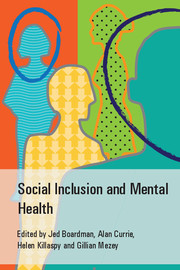Book contents
- Frontmatter
- Contents
- List of contributors
- List of tables, boxes and figures
- Foreword
- Preface
- Acknowledgements
- Scoping Group on Social Inclusion, Royal College of Psychiatrists
- Part 1 What is social exclusion?
- 1 Introduction
- 2 Concepts of social exclusion
- 3 Social exclusion of people with mental health problems and learning disabilities: key aspects
- 4 Policy and social exclusion
- 5 How is social exclusion relevant to psychiatry?
- 6 Socially inclusive working across the psychiatric subspecialties
- Part 2 Social exclusion: the scope of the problem
- Part 3 Working towards inclusive psychiatry
- Index
2 - Concepts of social exclusion
from Part 1 - What is social exclusion?
Published online by Cambridge University Press: 01 January 2018
- Frontmatter
- Contents
- List of contributors
- List of tables, boxes and figures
- Foreword
- Preface
- Acknowledgements
- Scoping Group on Social Inclusion, Royal College of Psychiatrists
- Part 1 What is social exclusion?
- 1 Introduction
- 2 Concepts of social exclusion
- 3 Social exclusion of people with mental health problems and learning disabilities: key aspects
- 4 Policy and social exclusion
- 5 How is social exclusion relevant to psychiatry?
- 6 Socially inclusive working across the psychiatric subspecialties
- Part 2 Social exclusion: the scope of the problem
- Part 3 Working towards inclusive psychiatry
- Index
Summary
Before any consideration of what it means to be socially included can be made it is important to start with a consideration as to what is social exclusion? Social exclusion and its related concepts are mainly to be found in the social policy literature. This chapter does not intend to provide a complete review of the field but rather to give a brief outline of the concepts of social exclusion so that we may consider in subsequent chapters how this might be applied to people with mental health problems and those with learning disability. It also gives some brief consideration to three areas of political philosophy: citizenship, justice and human rights.
What is social exclusion?
Social exclusion has emerged as a concept relatively recently. It is thus not surprising that there is still a lack of clarity about its definition. Some believe that this lack of clarity has certain advantages: ‘The expression is so evocative, ambiguous, multidimensional and elastic that it can be defined in many different ways [therefore] it can serve a variety of political purposes’ (Silver, 1994: p. 536).
The modern use of the term social exclusion appears to have originated in France in the 1970s (Burchardt et al, 2002a; Morgan et al, 2007), referring to les exclus, people who have slipped through the net of the social insurance system and are thus administratively excluded by the state, such as those who are disabled, lone parents and the unemployed. Other versions of the concept have focused on it being an inherent characteristic of capitalism (Byrne, 1999), a lack of recognition of basic rights (Gore & Figueiredo, 1997) and the existence of an underclass (Murray, 1999). In distinction to the first two versions, the last version tends to place responsibility for being excluded on individuals themselves. In the political field some see the term social exclusion as providing an alternative means of speaking of poverty when this term has not been acceptable to politicians (Berghman, 1995). A widely held characterisation of social exclusion is that it refers to the extent to which individuals are unable to participate in key areas of the economic, social and cultural life of society.
- Type
- Chapter
- Information
- Social Inclusion and Mental Health , pp. 10 - 21Publisher: Royal College of PsychiatristsPrint publication year: 2010

